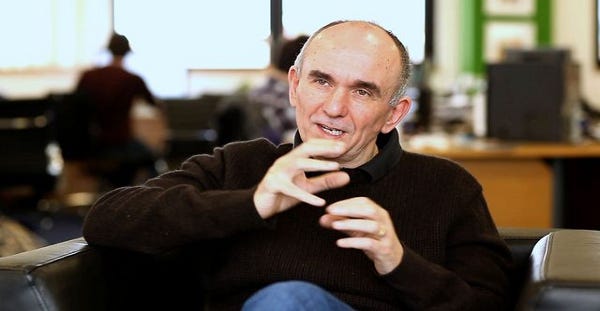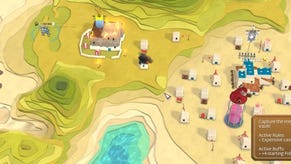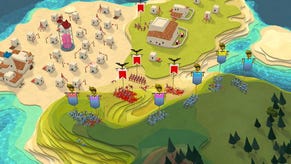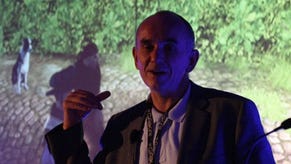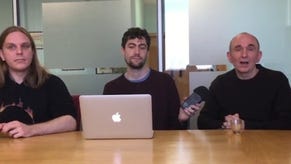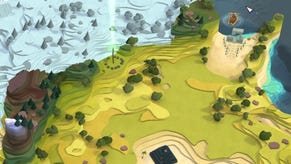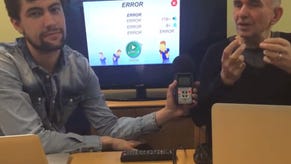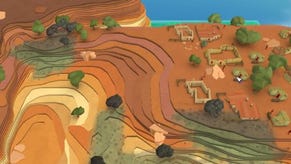Molyneux On GODUS' Surprise Publisher, Free-To-Play
Facing The Facts, Pt 2
Peter Molyneux likes to say things - perhaps a little too much, if a few forgotten promises pertaining to Curiosity and GODUS are any indication. Yesterday, he and I discussed Curiosity's aftermath, what it means for GODUS, and why things like a PC version of the almighty floating cubolith never surfaced. Today, we continue that discussion with what exactly the sudden (and very unexpected) addition of a publisher to GODUS' mobile arm means for everyone else, whether or not the game will employ free-to-play and/or microtransactions, and where all of this leaves 22Cans' much-ballyhooed 22 experiments. It's all after the break.
RPS: Moving on to the mobile version of Godus for a moment, you’re doing a publishing deal with DeNA. How is that going to change the game, especially relative to the PC version?
Molyneux: There’s a few things here. First, one thing comes back to Curiosity. I don’t know if you followed Curiosity at the start, but it was pretty ropy. We released the game, it crashed a lot, we lost people’s gold coins, there were a huge number of things that we didn’t get right. Part of the reason was that we had never really published anything before. We’re all just coders and artists here. There’s no one here that’s very good at publishing stuff.
We can handle doing the PC version ourselves, and we’re releasing that first for sure, but what Curiosity proved is that releasing on a billion mobile devices throughout the world, in all territories, going through all the hoops that Apple requires you to go through, and curating all of the problems from all the different Android versions is a non-trivial task. And it’s one which is hugely distracting for the team. When Curiosity was launched, we basically did nothing but service Curiosity for like three weeks. We just can’t do that. We’re not big enough to do that.
One of my obsessions at the moment is not to grow 22Cans. It’s to try and keep us focused on being just developers, and not to take on a huge infrastructure. It’s tempting to do that, because then if you take on a huge infrastructure you can do things like publish yourself. So we’re learning from what we did with Curiosity. We decided that we should concentrate on making games, and not publishing games.
That’s where DeNA came in. They can take on the burden of publishing and distributing the game. They know about the mobile side. They know about games that are successful. They know about things like communities and stuff like that, and we can learn from them. They have no creative control over Godus whatsoever. They have no intellectual charge over 22Cans. They have no investment in 22Cans. This is purely a segmented deal for the iOS and Android versions only. It has no effect whatsoever on the PC version or the Linux version or the Mac version or any other versions we may think about in the future, like consoles.
This is the mistake, the horrible, terrible, tragic mistake I made with Lionhead. I forgot who Lionhead should be. You have to define who you are, and what we are is obsessive developers. That’s what we should be. That’s what we should stay. If we try and make ourselves into something more than that or different from that, then we lost that obsessional, passionate quality that is the thing that makes a game great.
Lionhead grew to like 300 people. We just forgot who we were. We forgot why we were. We forgot what was important. If we can stay small, as 22Cans, and if we can stay obsessive about one thing and make that one thing brilliant and amazing, then we can stand up and hold our heads about the parapet and be proud. But if we start diluting it, then bad things happen. That’s my view. It’s the least American view you can possibly get, because to run a company successfully, you should always be tripling your turnover and you should increase your staff rate by 10 percent a year and all that stuff. This is not like that at all.
RPS: DeNA's a publisher, though - one known for free-to-play games, at that. Surely they'll want some say in what you'll be charging for Godus and how you'll incorporate those fees into the game?
Molyneux: There’s nothing in the contract that does that. I think you have to listen to people like that because they have a lot more experience than you. I’m obsessing about what we’re charging on the PC. It has to be the right price for the right experience. One of the big questions I want to ask the people who play the alpha and beta version is, what do you reckon we should charge for this game? And we’ll get our pricing structure from that. That seems to me to be the most influential way of judging the right price. Rather than me or even a publisher being able to say, “It is $2.99."
This is a huge issue, by the way. The price of computer games is set by who, at the moment? The price of console games. Who sets those prices? It’s not the publishers. It’s the retailers. They’re the ones that set the price, really. You would be insane to release Call of Duty at $9.95. That would never happen. It happens because it has to be priced in a certain way. The whole metaphor of how we charge for games, especially in this world of the different ways of getting money for people, is changing very radically.
I love the idea of, rather than saying, “Everything on Steam is $19.95, so we’ll be $19.95,” I much prefer the idea of getting the people who pledged to help us with that pricing decision. Maybe that goes terribly wrong and it ends up that Godus is 2,000 pounds a copy, or 20 pence a copy, or maybe, just maybe, this is a way to start judging the price. We have no expert marketing people here. We don’t even have particularly great financial people here. We’re trying to find one of those people, by the way. So it seems like the best people to ask are those people.
RPS: But also, during your Kickstarter, you explicitly stated that there'd be no publishers involved. It'd just be 22Cans collaborating with backers. What happens to that process now?
Molyneux: DeNA have no influence whatsoever on the design of the game, on the pricing of the PC version, on the release date of the PC version, nothing at all. That was one of the criteria we had. What I would say is that I would be a fool if I didn’t listen to them about pricing on mobile, because they have more experience. No real concrete decisions have been made on that as of yet, because we’re obsessing very much about the PC version at the moment.
Mobile players are going to get their digital copy. They’ve already paid for that digital copy. Whatever our decision, we will give value to that digital copy. We would be crazy not to do that, to recognize that. I think the fact – and of course I’m turning this around to be a net positive, as you do – but I think the fact that we’re no longer having to obsess about distribution and translation and all of that stuff is a good thing for the people that have pledged for a mobile version, because it means that we can focus on it being a great mobile game.
RPS: Ultimately, are you thinking free-to-play for Godus, or a more traditional upfront fee? If you're doing microtransactions, what will they be for?
Molyneux: The trouble is, with free-to-play is... If I came to you five years ago, before the extremely harsh, cruel free-to-play designs that we’ve seen on Facebook and mobile came around, if I said to you, “I’ve got this great idea. The next game we’re going to release will be free, and you’ll only pay for things that you use in the game,” you would be unbelievably positive about it. It’s only that free-to-play has been kind of twisted, in my mind. Twisted around… I’m going to say the word “greed,” but I’m not sure it’s the right word. It’s twisted around addiction.
There are certain games – I’m not going to name the games, because this is not a positive thing I’m saying at all – that have done that in a very unpalatable and unsavory and destructive way. But I still fervently - as a designer, purely as a designer – love the initial concept of free-to-play. Which is, you get to play the game, and you get to choose how to use the few dollars and cents that you want to invest in the game. You get to choose how you spend that money. I love that idea.
If a game is like a hobby, then I love spending money on my hobbies. I love spending money on cooking. I’ve got every kitchen gadget known to man. None of them are particularly useful, but I still love spending money on them. So I think there is a goodness to free-to-play that I’d love exploring as a designer.
That being said, we want to wait until we’ve got feedback from our pledgers before making any of these decisions. In the alpha, I’ve put certain things in the game, and I can watch how people interact with them to start making that decision. This decision, as I said earlier, isn’t a decision that feels like I’m an expert in making – how much to charge for my game or whether it should be full free-to-play or whether it should be free or whether it should be subscription. There’s a whole host of options there. It feels like any game feature nowadays that I design needs to be tested. Why should the pricing be any different than that?
So the only thing I’m going to say – I know it’s frustrating not to get a straight answer – is that we’re going to listen to many influences when we’re thinking about things like pricing and what to charge money for. We’re going to collect those together and it’s going to be more of a Kickstarter decision than it is one particular person like myself making the decision. If I said to people today, if I said the words “free-to-play,” everyone would throw stones at me. Because everyone’s experience with free-to-play is so tragic. If I said it’s going to be priced at $19.95 or $29.95 or $9.95, I’d probably get loads of negative reactions too, because it would either seem too expensive or too cheap or whatever. It doesn’t feel like a decision that we can make today. We need to get more data to make that decision.
RPS: How do you plan to collect that data? What's going to be the deciding factor in all this?
Molyneux: We have three, four ways of measuring those. We’ve been working hard on analytics. We are looking at people’s play styles. We’re looking at how often they interact with certain things. Some of these analytics were inspired by Curiosity and the questions that we kept asking ourselves about Curiosity. Some of them are particular to Godus. That’s the first way.
The second way is that periodically – and slightly aggravatingly, by the way – during playing the alpha and possibly the beta, it will pop up with some survey questions to ask you specific questions about specific issues at certain times during the game. Then you have got the ability to e-mail us directly about things that you’ve liked, things that you haven’t, things that you’re wondering about. Some of those e-mails will be, I’m sure, about things like bugs and stuff like that, but also about game features.
And then lastly there are the forums themselves, where I’m sure debates will rage. There are specific questions about pricing in the survey that we’ll ask. We’ll also be looking at these analytics to watch some of the game mechanics that we have put into the game, to test whether the more gradual monetization makes sense. It’s hard to really explain. But you only have to wait 24 hours if you pledged for alpha access.
RPS: Initially the idea behind 22Cans was to do 22 experiments and ultimately culminate them all in a big dream game. But you’ve also been describing Godus as your dream game. What’s the plan for the other 21 experiments? Is that still a thing that’s going to happen, or for now is it on the back burner in favor of Godus?
Molyneux: Certainly I would love [to keep doing them]. My original dream was to be able to do experiments and Godus at the same time. I’d love to have the time to do that. I don’t think that would be sensible to do at the moment. I think all of us are working extremely hard. I don’t like pushing people beyond their limits. I don’t think it’s right to give people so much work that they have to destroy their lives to do it, so we try and resist working very late or on weekends.
This means that there had to be some sacrifices, and some of those experiments are the sacrifices. There was another experiment I would love to do, but we just haven’t got the bandwidth to do it. That being said, Godus, when it’s released, isn’t finished. There are experiments in the alpha, and I’m not going to tell you where they are, but there are definitely experiments in the alpha which are interesting. I think when we’ve got Godus released and we’ve got more time, we’ll return to that experimental nature, and then continue adapting Godus as a result of those experiments. Because you’ve always got to remember that in today’s world, you can continue to develop a game for many, many years after the release, if people like it.
RPS: Thank you for your time.
